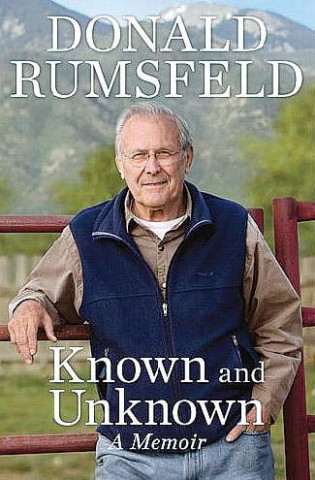Known and Unknown: It wasn’t me
Donald Rumsfeld’s most famous remarks in his memoir Known and Unknown made no sense at all.

If Known and Unknown has one theme it’s “It was the other guy’s fault.” For the Iraq disaster, which he micro-managed, he variously manages to blame Colin Powell, Condoleezza Rice, George Tenet, Jerry Bremer and Richard Armitage. Self-reflection isn’t built into Rumsfeld’s DNA. All autobiographies tend to wallow in post-facto rationalisations but also allow for mistakes to be admitted in hindsight. Rumsfeld, like his boss George W Bush, doesn’t believe he ever got anything wrong.
To convince readers of his infallibility, Rumsfeld lies and distorts the truth. He denies that anyone in the US government or military ever called for more troops to be sent to Iraq when the invasion was launched, even though the original war plans called for about triple the troops Rumsfeld sent. He also says that he never wanted Ahmed Chalabi to rule Iraq, conveniently ignoring that it was his Defence Department that flew Chalabi back to Iraq and his deputy Paul Wolfowitz publicly touted Chalabi’s leadership bona fides.
Perhaps the most galling passage in Known and Unknown is when Rumsfeld disavows any responsibility for torture. He blames the behaviour at Abu Ghraib on “a small group of prison guards who ran amok”, never thinking to admit that he was the one who conceived and implemented ‘enhanced interrogations’ in all US-run secret prisons and that these interrogations actually shared a lot of similarities with the torture at Abu Ghraib.
The only thing that makes this book fascinating is the unintended psychological portrait it provides of Rumsfeld. He is casually dismissive of anyone who is his intellectual inferior, which, with the exception of his good friend Dick Cheney, seems to include everyone in the Bush administration. After over 500 pages of name-calling and score-settling, Rumsfeld then has the gall to say he does not believe in personal attacks. That, in a nutshell, is Donald Rumsfeld. A man so loosely connected to reality every word he writes is suspect.
If there was one worthwhile thing about Rumsfeld it was his brilliant impromptu press conferences. The “known unknowns” brain fart aside, Rumsfeld was consistently hilarious, stylish and devastating when speaking. None of that has translated into his writing. His prose is leaden and the rawness of his anger leads to insipid writing that rarely rises above the level of vitriol. Known and Unknown should be put out to pasture and excavated only 30 years from now to prove to people who weren’t around for the Bush era just how insane and maddening it really was.
Published in The Express Tribune, Sunday Magazine, February 27th, 2011.



















COMMENTS
Comments are moderated and generally will be posted if they are on-topic and not abusive.
For more information, please see our Comments FAQ